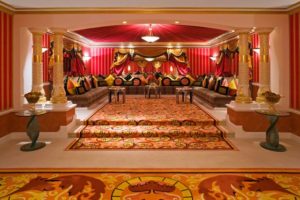
Too showy for this 1%er.
It is not easy to peek into the mind of a top tier 1%er for most of us 99%ers, no matter how close we are to the cut-off line. They travel in different groups, socialize with their own limited peers and generally frequent places that we don’t get admitted to or where the price of admission would not be justified even for those with ‘entry-level’ seven figure net worths.
I got a chance to observe a top tier 1%er from very close quarters for over 2 years. How? I happened to work for this gentleman for that period directly. In my role, I found myself having to travel along with him (of course, with him in first class, me in cattle class) to meet business prospects and potential investment partners in US and around the world. In all our meetings discussing strategy in hotels, airports and rental cars, I got to know him and his ilk a bit more. To give a perspective to you all, I would estimate his net worth to be around $60 million, so very rich obviously but not I-am-in-the-Forbes-100-list rich or even New York-page-3-socialite rich.
This article is to share what I learned from my first hand experience about this rarefied class of ultra-high net worth people. Note that this applies to those who built their wealth largely through their own business, not filthy rich inheritors or trust fund babies as I don’t know any. Besides, I am sure you also don’t care about trust fund babies who only know how to spend money they never earned. On the other hand, these guys either built something major from nothing or took a small business and made it big. So, here’s how this 1%er and people like him think:
Money is only for scoring.
Money is no longer serving the purpose for them that it might for you and me but money is how they keep score. Every game needs a scorecard, and for this 1%er, wealth is the scorecard. As he is not a super-spender, his kind of wealth serves no immediate purpose for him other than just to keep score.
They know they are way beyond FI and don’t care.
How do I convey this to you accurately? Hmm…Financial independence (FI), as an achievement, sounds to them somewhat like how you would feel when your neighbor kid proudly says he graduated high school, when you did your Ph.D. in Astrophysics from MIT years ago and have recently been told that you are among the nominees for this year’s Nobel Prize. Meh to FI. That sounds about right.
If they want to, they can just sell everything and buy treasury bonds and live off the interest for the rest of their life. Even at 1% interest, this will generate $600,000 in annual income for this 1%er, and even he admits it is a lot more than enough for him to enjoy life and pursue his hobbies.
They work for a purpose.
Their purpose may not always make sense for us but to them, it is everything. It is much bigger than passion. The purpose in this case is to develop and bring a new patentable product to market that improves the efficiency to 99.9999% from the current 99.99% industry standard. In case you are wondering why is this such a big deal, in engineering, this is an improvement to ‘6 logs’ from ‘4 logs’, or 100 times better! This would be worthy of a patentable invention. His goal beyond this? Take it to 8 logs (99.999999% efficiency), of course! In business terms, it’s like having a goal of ever-increasing revenues.
Millions are not a big deal.
They don’t think this from an arrogant point of view (though some might). The ones who built their wealth on their own rarely, if ever, are dismissive about money. They know it is not easy to get to the first million dollars in net worth. So, why is this not a big deal to them? The answer is purely relative. If you are in debt, $100,000 net worth sounds like a lot to you. It is, however, not that big a deal to you once you cross, say $500K in net worth. Just scale this principle to millions to understand this 1%er perspective on just a couple of million dollars.
They size you up real quick and real good.
These people didn’t get to where they are in life by being naive. I think they are endowed with or carefully develop the ability to size the potential of fellow humans quickly. It is this assessment about you that drives their conversation, topics and agenda with you. You might think it is casual chitchat but it is anything but. Even a casual-sounding conversation is done with some inner objective in mind. It is not necessarily sinister but they are driven to deeply understand or dominate the situation so they can take best decisions in every area and use your abilities to execute their decision, also while knowing which carrot to dangle in front of you. These are decisions that serve their best interest, of course. If you didn’t measure up in the first meeting, they would drop you like a hot potato and make a mental note to avoid you in the future at any cost. You can kiss their goodwill goodbye.

Burj-al-Arab hotel, Dubai (7-star luxury). A good place to get sized up.

The Royal Suite @ Burj-al-Arab. Idiots stay here apparently. Waiting for them at $24,000 a night.
They are sensibly frugal.
Again, this is relative. What’s sensibly frugal to you and me applies in a different scale for them. For this gentleman, it’s about choosing business class or first class in a commercial airplane instead of chartering a private jet. Same applies to cars, no Lamborghini but the latest Mercedes S Class, sure. Staying at a deluxe suite at a JW Marriott or even a Ritz Carlton is sensibly frugal than opting for the Royal suite at the Burj-al-Arab. This gentleman flat out calls his peers who splurge on these extravagances as idiots.
Giving is a business.
They donate to charitable causes but on their own terms using business-like metrics. You and I may gladly give $100 to Salvation Army or even $1,000 for a cause we feel worthy, and possibly forget about it. However, their giving is conditional, milestone-based and demands a plan from the recipient no different than what a business plan would look like. This gentleman once asked me to review a proposal from a charitable institution he got. He wanted me to apply my ‘business lens’ as he put it. This proposal was custom-created for this gentleman when he apparently asked them the question, what can you do if I gave you $2 million?
The race never ends.

Good car for the never-ending race?
This is the part that took a long time for me to understand. If you aren’t driven by a net worth or a passive income target, and if you are driven by a purpose that only serves as a milestone for another purpose (like ‘8 logs’), and if all the resources you have (money, people, network) are only stepping stones at your disposal for the ever-challenging business goals, then the race is truly never-ending. This gentleman is not mean or rude, far from it, but his innate drive to win a never-ending race finally made me understand why he is able to catch a red-eye flight from California to New York and be fully attentive next morning in an early breakfast meeting at 7:30 am.
Why they make this race never-ending is best known to them but this defines who they are.
I hope I have been able to give you a glimpse of what a real 1%er thinks and how he lives his life. This peek, I hope, demystifies some of your notions and beliefs about this ‘upper class’ as it did mine prior to the personal experience.
Raman Venkatesh is the founder of Ten Factorial Rocks. Raman is a ‘Gen X’ corporate executive in his mid 40’s. In addition to having a Ph.D. in engineering, he has worked in almost all continents of the world. Ten Factorial Rocks (TFR) was created to chronicle his journey towards retirement while sharing his views on the absurdities and pitfalls along the way. The name was taken from the mathematical function 10! (ten factorial) which is equal to 10 x 9 x 8 x 7 x 6 x 5 x 4 x 3 x 2 x 1 = 3,628,800.

26 comments on “A Peek Into a Real 1%er”